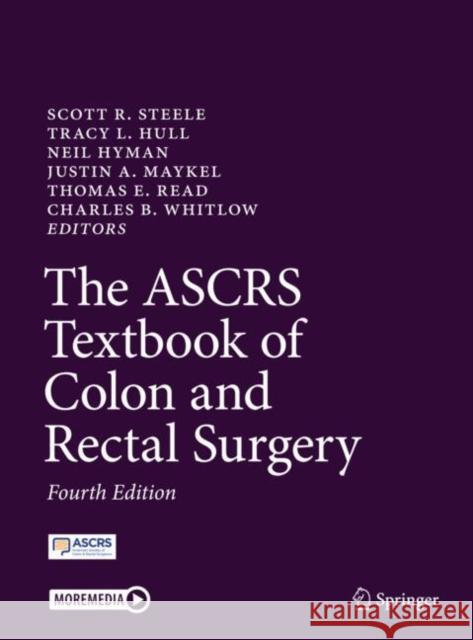The Ascrs Textbook of Colon and Rectal Surgery » książka



The Ascrs Textbook of Colon and Rectal Surgery
ISBN-13: 9783030660482 / Angielski / Twarda / 2021 / 1218 str.
The Ascrs Textbook of Colon and Rectal Surgery
ISBN-13: 9783030660482 / Angielski / Twarda / 2021 / 1218 str.
(netto: 535,46 VAT: 5%)
Najniższa cena z 30 dni: 501,19
ok. 16-18 dni roboczych.
Darmowa dostawa!
Anatomy and Embryology of the Colon, Rectum and Anus.- Colonic Physiology.- Anorectal Physiology.- Endoscopy.- Endoscopic management of polyps and endolumenal surgery.- Pre-operative evaluation in the colorectal patient.- Optimizing Outcomes with Enhanced Recovery.- General Postoperative Complications.- Anastomotic Construction.- Anastomotic Complications.- Hemorrhoids.- Anal Fissure and Anal Stenosis.- Cryptoglandular Abscess and Fistula.- Rectourethral and complex fistulas: evaluation and management.- Rectovaginal Fistula.- Pilonidal Disease and Hidradenitis Suppurativa.- Dermatology and Pruritus Ani.- Sexually transmitted infections of the Colon and Rectum.- Anal intraepithelial neoplasia.- Anal Cancer .- Presacral Tumors.- Sporadic and Inherited Colorectal Cancer: How Epidemiology and Molecular Biology Guide Screening and Treatment.- Management of Malignant Polyps.- Colorectal cancer: Preoperative evaluation and staging.- Colon Cancer Surgical Treatment: Principles of Colectomy.- Rectal Cancer: Neoadjuvant Therapy.- Rectal Cancer: Local Excision.- Rectal Cancer: Non-operative management.- Proctectomy for Rectal Cancer.- Colorectal Cancer: Postoperative Adjuvant Therapy and Surveillance.- Colorectal Cancer: Management of Distant Metastases.- Locally Recurrent Rectal Cancer.- Appendiceal Neoplasms.- Gastrointestinal Stromal Tumors, Neuroendocrine Tumors, and Lymphoma.- Cytoreductive Surgery (CRS) and Hyperthermic Intraperitoneal Chemotherapy (HIPEC).- Colorectal cancer: minimally invasive surgery.- Minimally Invasive Complete Mesocolic Excision with Extended Lymphadenectomy for Colon Cancer.- Colonic Diverticular Disease.- Large Bowel Obstruction.- Lower GI Hemorrhage.- Endometriosis.- Benign Colorectal Disease Trauma of the Colon and Rectum.- Inflammatory Bowel Disease: Pathobiology.- IBD Diagnosis and Evaluation.- Medical Management of Ulcerative Colitis.- Medical Therapy for Crohn’s Disease.- Anorectal Crohn’s Disease.- Crohn’s Disease: Surgical Management.- Ulcerative Colitis – Surgical Management.- Complications of the Pelvic Pouch.- Infectious Colitis.- Clostridium difficile Infection.- Radiation, Microscopic, and Ischemic Colitis.- Intestinal Stomas.- Abdominal Wall Reconstruction and Parastomal Hernia Repair.- Functional Disorders after Colorectal Surgery/ IBS.- Common Tests for the Pelvic Floor.- Evaluation of Constipation and Treatment of Abdominal Component.- Treatment of Difficult/Obstructive Defecation.- Rectal Prolapse.- Fecal Incontinence: Evaluation and Treatment.- Low Anterior Resection Syndrome (LARS).- Sexual Function After Colorectal Surgery in Women.- Male Genitourinary Dysfunction as a Consequence of Colorectal Surgery.- Middle and Anterior Pelvic Compartment: Issues for the Colorectal Surgeon.- Pediatric Colorectal Disorders.- Considerations for Geriatric Patients Undergoing Colorectal Surgery.- Healthcare Economics.- Ethical Considerations (Conflict of Interest, Surgical Innovation, End of Life).- Welcome to Litigation.- Quality.- Practice Management.
Scott R. Steele
Chairman, Department of Colorectal Surgery
Rupert B. Turnbull, M.D. Endowed Chair in Colorectal Surgery
Cleveland Clinic
Cleveland OH
USA
Tracy L. Hull
Professor of Surgery
Cleveland Clinic
Department of Colorectal Surgery
Cleveland, OH
USA
Neil Hyman
Professor of Surgery
Co-Director, Center for Digestive Disease
Chief, Section of Colon and Rectal Surgery
University of Chicago Medical Center
Chicago, IL
USA
Justin A. Maykel
Professor of Surgery
Chief, Division of Colon and Rectal Surgery
University of Massachusetts Memorial Medical Center
Worcester, MA
USA
Thomas E. Read
Cracchiolo Family Professor of Surgery
Chief, Division of Gastrointestinal Surgery
University of Florida College of Medicine
Gainesville, FL
USA
Charles B. Whitlow
Chairman, Department of Colon and Rectal Surgery
Ochsner Clinic
New Orleans, LA
USA
1997-2026 DolnySlask.com Agencja Internetowa
KrainaKsiazek.PL - Księgarnia Internetowa









